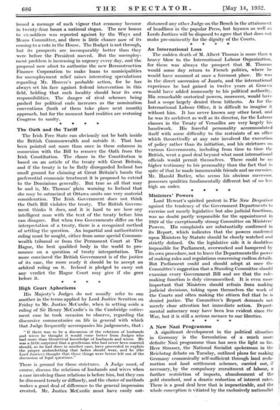The Oath and the Tariff The Irish Free State can
obviously not be both inside the British Commonwealth and outside it. That has been pointed out more than once in these columns in connexion with the Bill to remove the Oath from the Irish Constitution. The clause in the Constitution is based on an article of the treaty with Great Britain, and if the treaty is to be flatly disregarded Ireland has small ground for claiming at Great Britain's hands the preferential economic treatment it is proposed to extend to the Dominions generally. But true as all that may be and is, Mr. Thomas' plain warning to Ireland that she may be ostracized at Ottawa omits one very material consideration. The Irish Government does not think the Oath Bill violates the treaty. The British Govern- ment thinks it does, and it is hard to see how any intelligent man with the text of the treaty before him can disagree. But when two Governments differ on the interpretation of a treaty, there is a recognized method of settling the question. An impartial and authoritative ruling must be sought, either from some special Common- wealth tribunal or from the Permanent Court at The Hague, the best qualified body in the world to pro- nounce on a question of treaty interpretation. The more convinced the British Government is of the justice of its ease, the more ready it should be to accept an arbitral ruling on it. Ireland is pledged to carry out any verdict the Hague Court may give if she goes before it.
* S * *




































 Previous page
Previous page